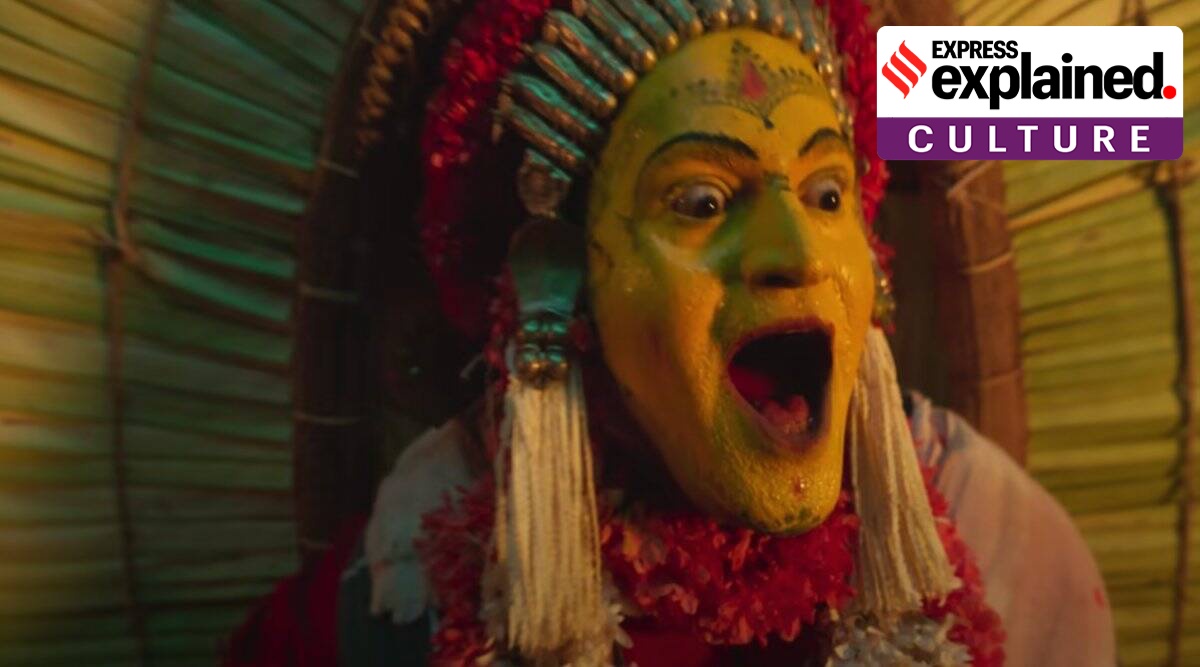Ever since its release on September 30, the Kannada film Kantara has garnered positive reviews, becoming the highest-rated Indian film on the online movie database IMDB with a rating of 9.3 out of 10. Commercially too, the film is making its mark and close to earning Rs 200 crores.
However, of late it has been at the centre of controversy. Several complaints were filed against actor and activist Chetan in Karnataka over his statements on a cultural practice depicted in the film, and on Saturday (October 22), Bengaluru police registered a case against him under Indian Penal Code section 505 (2) (Statements creating or promoting enmity, hatred or ill-will between classes). Police registered a case after Shiva Kumar, Bajarang Dal convenor of Bengaluru North, filed a complaint.

Here is what you need to know about the controversy.
What is the movie Kantara about?
Kannada actor and director Rishab Shetty stars in the movie, which has been dubbed in Hindi, Tamil, Telugu and Malayalam.
The fictional story is inspired by the relationship shared between forests and human beings and takes place over almost two centuries. In 1847, a king journeying in search of peace of mind ends up in a forest, where he miraculously finds it in the form of Panjurli, a divine spirit that protects the forest and its inhabitants. He then proceeds to request the forest dwellers to let Panjurli return home with him, and in turn, gives them rights over the forest lands.
The film then moves to the 1990s, when a forest officer wants to declare the forest as a ‘reserve forest’, a bureaucratic term mostly unheard of by residents. Meanwhile, a descendant of the king has become the ‘landlord’ of the forest dwellers now, and Shetty plays their unofficial, young leader. Shetty is also a descendant of the family that traditionally performs ‘Bhoota Kola’, an animist form of worship widely practised in coastal Karnataka. The current issue relates to Bhoota Kola.
Also Read | What makes Rishab Shetty’s Kantara one of the highest-grossing Kannada films of all time
What is Bhoota Kola?
Bhoota Kola is an annual ritual performance where local spirits or deities are worshipped. It is believed that a person performing the ritual has temporarily become a god himself. This performer is both feared and respected in the community and is believed to give answers to people’s problems, on behalf of the god. There are several ‘Bhootas’ who are worshipped in the Tulu-speaking belt of Dakshina Kannada, Uttara Kannada and Udupi districts. It is usually performed in small local communities and rural areas.
What is the controversy all about?
During an interview, Rishab Shetty said that the practice of Bhoota Kola was part of Hindu culture. “It is part of Hindu culture and rituals. I am a Hindu and I believe in my religion and customs which nobody can question. What we have said is through the element that is present in Hindu dharma.”
Actor-turned-activist Chetan Kumar, however, said Bhoota Kola was not part of Hindu tradition but of indigenous people who are Adivasis, and it had been “hijacked” by Aryans who came to India in the later years.
In a tweet, Chetan said, “Glad our Kannada film ‘Kantara’ is making national waves. Director Rishab Shetty claims Bhoota Kola is ‘Hindu culture’. False. Our Pambada/Nalike/Parawa’s Bahujan traditions predate Vedic-Brahminical Hinduism. We ask that Moolnivasi cultures be shown w/ truth on & off screen.”
Chetan has been vocal about socio-cultural issues for long, and is a familiar face in movements for the welfare of farmers, workers, Dalits and Adivasis. He has spoken for the rehabilitation of endosulfan poisoning victims (2013), securing homes for tribals evicted from Kodagu, Karnataka (2016) and, more recently, for a separate religious status for Lingayats. In February this year, Chetan was arrested for his alleged remarks against a Karnataka High Court judge hearing the hijab in school cases.
“Karnataka’s land has its own culture, tradition and history even before the Hindu religion began. Bhoota Kola and other practices are part of the Adivasi culture and have been existing for several thousand years,” he added. Rishab Shetty has said in response, “No comments. I should not respond. When I was making this movie, those people who practised this culture were with me and I have been very cautious. I come from the same part and know about it. But still, I do not want to comment about it as only people who perform it have the right to speak.”
Most Read 1When ex-ISRO chief was told to ‘get lost’ by ISRO satellite centre 2Bigg Boss 17 confirmed list of contestants: Munawar Faruqui, Ankita Lokhande-Vicky Jain, Isha Malviya-Abhishek Kumar in Salman Khan show 3Suhasini Maniratnam says people know Aishwarya Rai only as a ‘beauty’, but she knows her as a ‘real person’: ‘She has got so many qualities…’ 4How Jews first migrated to Palestine, and how Israel was born 5Jakhar says caught off guard: Shot in arm for Congress as several big guns announce ‘ghar wapsi’ from BJP, SADBest of ExplainedWhat is ‘foetal viability’ in abortion, and do the rights of an unborn child matter?Economics laureate’s book charts women’s aspirations, role in workforceThis Quote Means: 'Women… are fuelled by a will to survive', from Iran's Nobel Prize winnerClick here for more
What were the reactions to these statements?
Chetan received backlash from many quarters over his statement, especially from Hindu right-wing activists.
Sri Rama Sene Chief Pramod Muthalik said that Kantara represents Hindu culture and tradition. “Chetan doesn’t know the culture and tradition of the land. He is an atheist and a communist. He is one among those ‘intellectuals’ who criticise the culture of the land. He is trying to spoil the peace of society,” he added.
Also ReadMadhya Pradesh CM unveils Adi Shankaracharya statue at Omkareshwar: Its s…Heard the ‘Makeba’ song viral on Instagram reels? Here’s the story of the…The true story behind Rani Mukherjee’s latest film ‘Mrs Chatterjee vs Nor…Mahakal temple in Ujjain: Why it holds special significance in HinduismAlso Read | The history of Tulu, and the demand for official language status
However, Chetan also received support from Dalit organisations. Dalit leader and former mayor of Mysuru City Corporation Purushothama said at a press meet that Dalit and backward communities stood with Chetan. Also, Kannada writer KS Bhagwan in Mysuru on Saturday said that worshipping was not part of the culture but it was introduced by Aryans who came from central Asia 3,500 years ago and then Vedic culture also came into existence. He said, “Chetan is correct that indigenous or original descendants did not practice Bhoota Kola but started only after Vedic practices entered India.”



